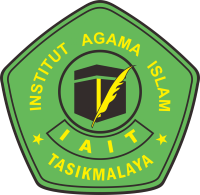Application of the Tafsir Tarbawi Concept in Ethical and Moral Education
DOI:
https://doi.org/10.61166/kasyafa.v2i1.65Keywords:
Tarbawi Tafsir, Ethical Education, Moral Education, Al-Qur'an, Islamic CharacterAbstract
Ethical and moral education is one of the fundamental elements in forming individuals with good character and virtuous values in social life. In the Islamic context, integrating religious values is an important basis in building a generation with noble character. One relevant approach to realizing this goal is through the application of the concept of tarbawi interpretation. Tarbawi interpretation is a method of interpretation of the Qur'an that focuses on educational aspects, both individually and socially, to develop noble moral and ethical values. This concept offers a practical guide to internalizing the teachings of the Qur'an in the context of applicable ethical and moral education. This paper aims to explore the application of tarbawi interpretation as an educational approach that can strengthen the character formation of students. By integrating the teachings of the Koran which are interpreted tarbawi, educators can present learning methods that are not only theoretical, but also emphasize the application of these values in everyday life. The discussion begins with an explanation of the concept of tarbawi interpretation, its basic principles, and its relevance in education. Furthermore, this paper evaluates the extent to which the concept of tarbawi interpretation can be applied in ethical and moral education curricula at various levels of education, both formal and non-formal. The results of the study show that the application of tarbawi interpretation is able to provide a deep understanding of the importance of universal values taught in Islam, such as honesty, responsibility, justice and tolerance. With this approach, students are not only invited to understand religious teachings textually, but are also directed to practice them in various aspects of life. Apart from that, tarbawi interpretation also allows educators to design learning materials that suit the needs of the times without eliminating the essence of Islamic teachings. Thus, this paper concludes that the concept of tarbawi interpretation contributes significantly to building a holistic and sustainable ethical and moral education system. Further research is needed to develop more effective implementation methods and models so that the values of the Qur'an can be optimally integrated in every aspect of educational life.
References
Abuddin, N. (2005). Pendidikan Islam dalam Perspektif Kontemporer. Jakarta: Kencana.
Abdullah, M. (2018). Konsep Pendidikan Berbasis Nilai Al-Qur'an. Yogyakarta: LKiS.
Al-Ghazali. (1994). Ihya Ulumuddin. Beirut: Dar al-Fikr.
Al-Mawardi. (2010). Adab al-Dunya wa al-Din. Riyadh: Dar al-Fikr.
Aristoteles. (1941). Nicomachean Ethics. New York: Random House.
Bertens, K. (2013). Etika. Jakarta: Gramedia Pustaka Utama.
Durkheim, É. (1961). Moral Education. New York: Free Press.
Franz Magnis-Suseno. (1997). Etika Politik: Prinsip-prinsip Moral Dasar Kenegaraan Modern. Jakarta: Gramedia.
Hanafi, M. (2014). Tafsir Tarbawi: Pendidikan Islam dalam Perspektif Al-Qur'an. Jakarta: Rajawali Press.
Hasan, L. (2001). Manusia dan Pendidikan. Jakarta: Gema Insani Press.
Ibnu Katsir. (2004). Tafsir Al-Qur'an al-Azhim. Riyadh: Dar al-Salam.
Kant, I. (1993). Groundwork of the Metaphysics of Morals. Cambridge: Cambridge University Press.
Langgulung, H. (2003). Asas-asas Pendidikan Islam. Jakarta: Pustaka Al-Husna Baru.
Magnis-Suseno, F. (1987). Etika Dasar: Masalah-masalah Pokok Filsafat Moral. Yogyakarta: Kanisius.
Mukhlis, H. (2010). Tafsir Tarbawi: Pendekatan Pendidikan dalam Al-Qur'an. Bandung: Al-Bayan.
Nata, A. (2013). Metodologi Studi Islam. Jakarta: Rajawali Pers.
Nasution, H. (2000). Islam Ditinjau dari Berbagai Aspeknya. Jakarta: UI Press.
Quraish Shihab, M. (2002). Tafsir Al-Mishbah. Jakarta: Lentera Hati.
Quraish Shihab, M. (1996). Membumikan Al-Qur'an. Bandung: Mizan.
Rahmat, J. (2011). Pendidikan Islam dan Karakter. Jakarta: Erlangga.
Shihab, M. Q. (2006). Wawasan Al-Qur'an: Tafsir Tematik atas Pelbagai Persoalan Umat. Bandung: Mizan.
Sudjana, N. (2005). Metode dan Teknik Pembelajaran Partisipatif. Bandung: Alfabeta.
Sukardi, D. (2008). Metode Pendidikan Islam. Yogyakarta: Pustaka Pelajar.
Tafsir, A. (2010). Metodologi Pengajaran Agama Islam. Bandung: Remaja Rosdakarya.
Tilaar, H. A. R. (2003). Mencari Pendidikan yang Relevan. Jakarta: Grasindo.
Yusuf, M. (2022). Integrasi Nilai Al-Qur'an dalam Pendidikan Moral. Malang: UIN Maliki Press.
Yusuf, R., & Suherman, A. (2019). "Penerapan Nilai-nilai Islam dalam Kurikulum Pendidikan". Jurnal Tarbiyah Islamiyah, 13(2), 45-60.
Zubaedi. (2012). Pendidikan Karakter: Konsep dan Implementasi. Jakarta: Kencana.
Zuhdi, M. (2015). Pendidikan Islam: Mengintegrasikan Nilai Al-Qur'an ke dalam Kurikulum. Surabaya: Amanah Press.
Zuhri, M. (2017). "Tafsir Tarbawi dan Implementasinya di Pesantren Modern". Jurnal Pendidikan Islam, 14(1), 75-90.
Downloads
Published
How to Cite
Issue
Section
License
Copyright (c) 2025 Ahmad Rival Anshori, Ahmad Mirza

This work is licensed under a Creative Commons Attribution 4.0 International License.












